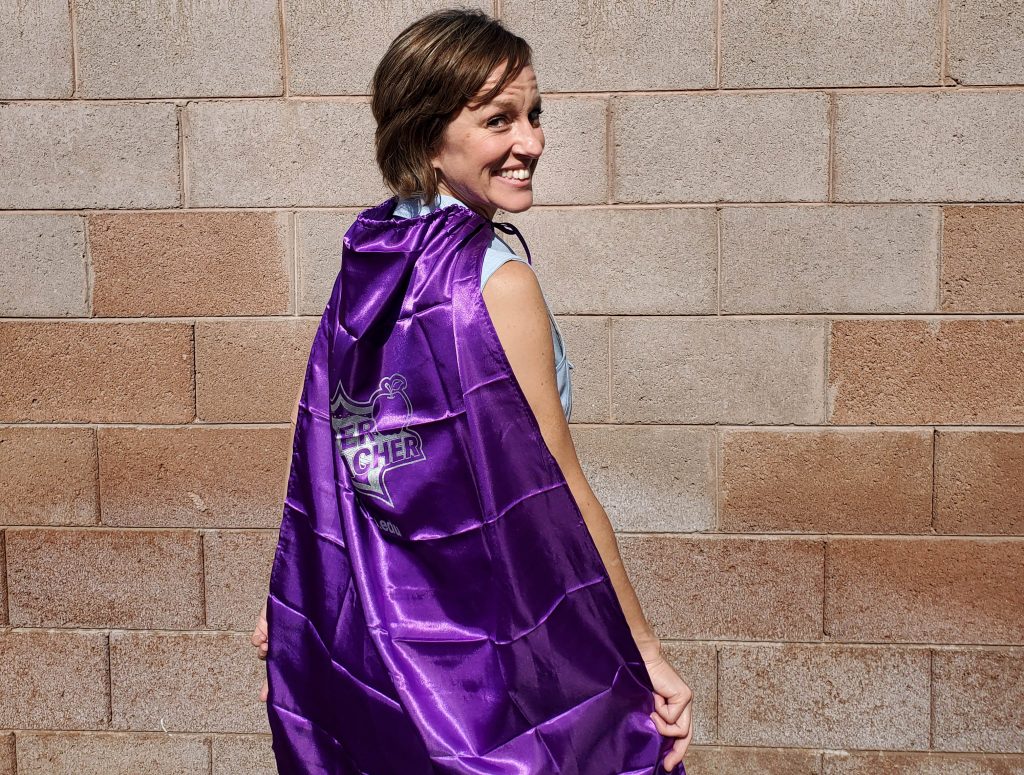
By Lana Sweeten-Shults
GCU News Bureau
Scott Wade refuses to let the grass grow under his feet.
He hit some sweet notes as a musician.
Worked at a pension company.
Was a lawyer.
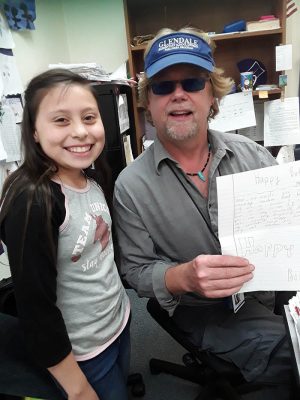
But while he enjoyed those professional jaunts, teaching has given him a sense of fulfillment he hasn’t found elsewhere.
“Every day is different; it’s something I never received from a career,” said Wade, who had a friend who was a teacher and decided to start substitute teaching four years ago.
He enjoyed it so much that when he heard the Glendale Elementary School District was hiring aspiring teachers under emergency certification, he was in.
“But after so many years, you can’t keep doing emergency,” said Wade, one of the first 14 graduates of the pilot program for Grand Canyon University’s Canyon L.E.A.P. to Teach, which offers teachers an alternative pathway to licensure at a time when the state is experiencing a dire teacher shortage.
GCU on Thursday celebrated the initiative’s inaugural cohort with a virtual graduation ceremony.
Teacher candidates received congratulations from several speakers and a package they opened during their Zoom call that included a purple Super Teacher cape and other GCU swag.
College of Education Associate Dean Dr. Marjaneh Gilpatrick also reminded them of the college’s Promise — to provide assistance to COE’s graduates in their first year of teaching at no expense.
“We’ll be right there to walk alongside you and to help you,” she said.
According to a December 2020 survey of the Arizona School Personnel Administrators Association, the needle has moved very little over the past six years when it comes to alleviating the state’s teacher shortage.
Teacher pay in the state remains one of the lowest in the country despite recent education budget increases, and the state maintains one of the highest class-size ratios. The COVID-19 pandemic didn’t help, with more teachers and staff separating from their employment or taking leaves of absences than in previous years, noting the pandemic as the primary reason.
Survey data revealed that 27% of teacher vacancies across the state remain unfilled and 47% of the vacancies are filled by teachers who do not meet the state’s standard certification requirements.
Responding to those staggering statistics, GCU President Brian Mueller in 2019 issued a challenge to the College of Education and Canyon Professional Development, a branch of the University’s K12 Educational Development. He said, “Can we create a boot camp to take mid-career people whose lives have changed, and can we create a special way for them to get into this (teaching) within their lifestyle that sends them into a whole new career direction?”
The answer was Canyon L.E.A.P. to Teach. (The acronym stands for Local Education Agency Pathway.)
GCU sought help from school districts in Tolleson and Glendale, as well as from the Alhambra Elementary School District and an area charter school to develop a program that would combine online study, weekend boot camps, direct supervision from College of Education instructors and support from the school districts.
The Arizona State Board of Education approved the program in August 2020, and the students in the pilot class started their studies soon afterward.
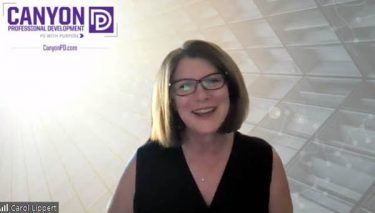
“The ultimate goal is to get more certified teachers into Arizona classrooms,” said Carol Lippert, Executive Director of K12 Outreach and Education Program Development.
One of the prerequisites to be a part of the program was that Canyon L.E.A.P. to Teach candidates had to have been teaching in the classroom already.
While most had subject matter experience, what they lack – and where GCU fills in the gap – is classroom management, how to communicate with parents, policies and procedures, and the like.
“There were so many things. Even after doing it for three years, I was picking up tips from teachers … the strategy and techniques on the practical side of things,” said Wade.
“I was doing these things, but I didn’t have the academic language down. Now I understand what everybody was talking about,” he said of learning teacher concepts such as the “I do, we do, you do” model of teaching and something called differentiated instruction, which is tailoring instruction to meet individuals’ needs. “I have all these new words and concepts I can discuss with everybody intelligently. It gives you a lot of confidence. Now I get it.”
What’s unique about the program, Lippert said, is it is offered through a university (other programs are offered through companies), it can be completed in a matter of months rather than years and it involves three arms coming together to support those in the program.
“They had the support from Canyon Professional Development. Each had an instructional supervisor from the College of Education that worked with them directly, and they also were assigned mentors from their local districts.”
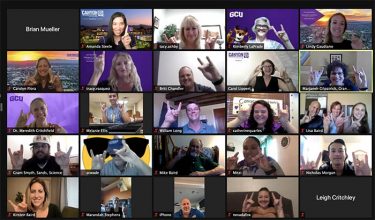
She added that what she found interesting about this group is the wide swath of experience across the cohort.
“Some had been teaching for a number of years, and some were brand new,” Lippert said. “One of them, from Lake Havasu, started teaching just days before we started the program. Another, Lisa Baird, has been teaching for a number of years.”
Baird, who graduated with a bachelor’s degree from GCU in 1998 and is an educator for Prism Education Center, has been teaching off and on for 20 years.
She hasn’t completed her certification, she said, “just due to circumstances of life,” yet she has home-schooled her daughters, was a guest teacher, then taught at a charter school before joining Prism Education Center (Northgate School), a virtual program with a presence in Arizona.
Baird tried alternative certification programs before but always seemed to be missing this or that class and hit wall after wall: “Navigating that whole system, it was a constant battle,” she said.
She interpreted those struggles as God closing the door.
“I said, ‘Lord, I have tried. If You want me to do this, it’s going to be something that falls in my lap,’” she said.
That’s when she got a call and learned about Canyon L.E.A.P. to Teach.
“It ended up being a whirlwind of activity and learning and support and encouragement … at probably the worst time,” she said of teaching and trying to get her certification during a pandemic. “But that was the excitement of the journey.”
She would take the lessons she learned and immediately apply them in her classroom.
Her family attended Thursday’s virtual graduation ceremony to do what they always do – support her. Not that they have been the only ones.
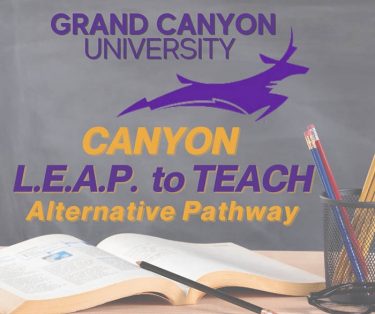
“I think I’ve always had this burden in my heart for teachers, and I think connecting with the faculty and staff at GCU, I saw the same thing in them … the resource they are, the way they open their hearts and lives. They’re constantly offering. It’s just that peer support and encouragement,” she said.
At the ceremony, Mueller thanked the teacher candidates for going into teaching “the greatest occupation, for so many reasons,” he said, and shared his own story in education.
“I come from a family of eight kids. … All of us went into teaching,” said Mueller, who was a high school teacher and a professor at his alma mater, Concordia University, before becoming GCU’s president.
“When I went to school to become a teacher, when I got there as a freshman, they said to us, ‘God bless you for being here, but we can’t guarantee you a job because everybody wants to be a teacher today.’ … But over the course of decades, that whole thing has been reversed.
“And now we’re in a situation where we’ve got to rebrand the teaching profession. We have to bring back enthusiasm for people that want to be in the classroom with kids,” he said.
Wade and Baird and the 12 others who graduated from the course? They have that enthusiasm.
“You never know where the day takes you with the kids,” Wade said. “The kids are extraordinary. They’re so much fun.”
Added Baird, “I love the impact that you have on students’ lives and families’ lives. It’s constant development and growth. It’s something I feel called to do.”
The next Canyon L.E.A.P. to Teach will be offered two ways, as an on-ground option and an online option. The next cohort starts in August.
GCU senior writer Lana Sweeten-Shults can be reached at [email protected] or at 602-639-7901.
***
Related content:
GCU Today: GCU initiative facilitates the L.E.A.P. into teaching
GCU Today: How GCU remains one of the largest sources of teachers



































































